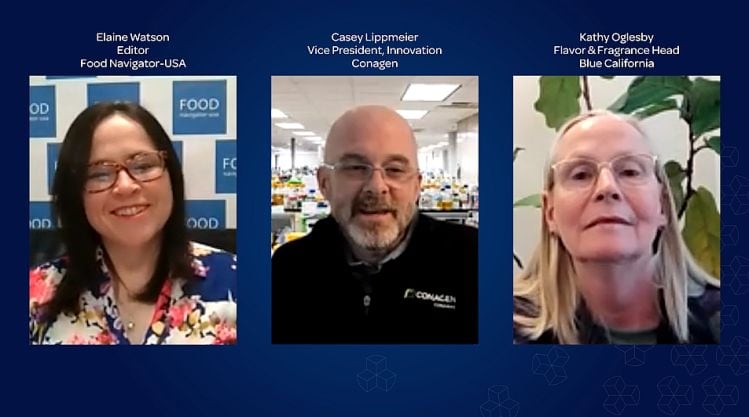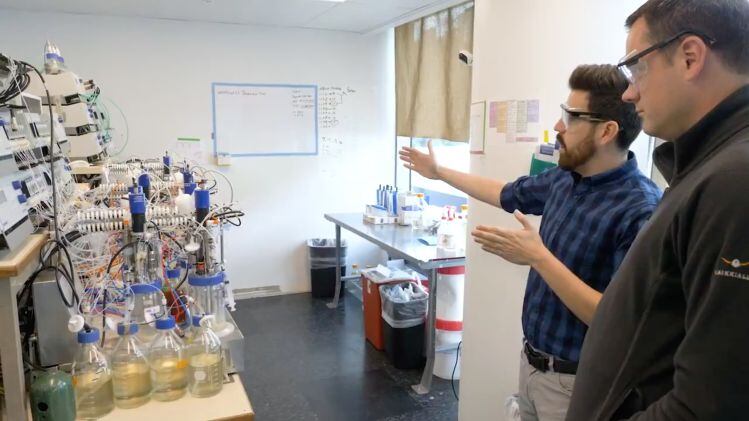Right now, says Debut Bio’s co-founder and CEO Dr Joshua Britton, you can extract colors, flavors, and bioactives from plants, which can be expensive, inefficient, and not very sustainable if you’re devoting acres of agricultural land to grow plants that only contain trace levels of these ingredients in a growing cycle that might take months or even years.
As a result, more companies are now using synthetic biology to engineer microbes to express food ingredients from flavors to collagen in big fermentation tanks filled with sugary feedstock.
‘Bacteria and yeast have been the workhorses of industrial biomanufacturing for years. Unfortunately, these bio-factories have their drawbacks’
But microbial fermentation can’t produce everything the food industry wants, said Britton: “Many of the great ingredients we find in nature are too complex to be made inside a [yeast/bacteria] cell, so they’re still being extracted from fruits or insects [eg. cochineal].
“Some carotenoids can be made from microbial systems [eg. the orange colorant beta-carotene can be made by a filamentous fungus called Blakeslea trispora], but there are lots of other carotenoids and other natural colors that can’t be made this way, so they are still extracted [from plants] or produced via chemical synthesis.”
Microbial fermentation systems also presents certain challenges including low yields and high purification costs (target ingredients are either secreted into the tank, and require subsequent purification, or locked within the cells, requiring an extraction process), he added.
“Bacteria and yeast have been the workhorses of industrial biomanufacturing for years. Unfortunately, these bio-factories have their drawbacks; reaction times can be slow, the product and starting material have difficulty passing through the cell wall, and each cell must be reprogrammed to produce a new molecule. They also use a batch process.”
Continuous – rather than a batch - process
At cell-free biomanufacturing startup Debut Bio, by contrast, Britton is taking some of the machinery of cells (custom-designed enzymes, nature’s tiny biological catalysts) and immobilizing them (essentially fixing them in place) such that they can convert low-value materials such as glucose into high-value ingredients, in a continuous process.
This allows Debut Bio – a UC Irvine spin-off - to operate across a wider range of conditions (pH, temperature) and allows for metabolic transformations that are not possible in cellular [microbial fermentation] systems, he claimed.
“[Yeast/bacteria etc] cells have to be kept at a neutral pH, whereas food ingredients harvested from plants often require more variable pHs, but if you try and mimic that process [in a host microorganism] you’ll kill the cell. Cell walls have also evolved over millions of years to keep things in, so some of these more advanced food ingredients that companies want to make get stuck in the wall. By removing the cell wall and potential toxicity issues, we can remove the handcuffs of the cell.
“We also don’t need gigantic fermenters. We flow renewable feedstocks through our [much smaller] reactors and out the other side comes functional food ingredients.”
‘We don’t need giant fermenters’
He added: “We’ve developed a technology platform that enables us to produce highly functional ingredients such as antioxidants, natural colors and preservatives using industrial biotechnology.
“We’re removing the cell and using some of the great things happening inside of it, without the constraints. Unlocking that constraint has allowed us to target hundreds of food ingredients. Our dream is that all of these high-end functional food ingredients become accessible at high purity and lower cost.”
‘We don’t have to worry about separating the enzyme from the final food ingredients’
While enzymes – which themselves are made from host microbes such as E. Coli or yeasts – are not cheap, Debut Bio has come up with a technique to deploy them efficiently, he said.
“Once we create the protein [enzyme] once, we don’t need to keep creating it, we can stick it to a bead [to ‘immobilize’ it] and use it and use it again.
“We chemically bind the enzyme to a resin support so that it will remain attached while the fluid is flowing over the protein. This is in contrast to a non-immobilized enzyme/protein where it is floating around freely in a reactor.
“We do this because we can pack a huge amount of enzyme into a small place and do effective bio-transformations. The enzymes are often also more stable, can be reused (we have reused one for 30 days before), and we don’t have to worry about separating the enzyme from the final food ingredients.”
‘We’re going after ingredient classes that people have said can’t be done [via cell-based fermentation]’
Some companies such as Conagen are using enzymes in bioconversion processes to convert lower-grade stevia extracts into higher-value, more scarce steviol glycosides such as Reb M. So how is what Debut Bio doing different to this?
Debut Bio is just taking this a step further, he claimed, using enzymes for more complex and intricate bio-conversions that mimic complex metabolic pathways found in plants and other organisms, such that you don’t have to start with a still-expensive plant extract, but could start with a cheaper feedstock.
‘We’ve partnered with a large ingredient manufacturer for a certain class of food ingredients’
While some companies such as German startup LenioBio are using cell-free biomanufacturing techniques to express proteins, Debut Bio is focusing on things such as phytonutrients, said Britton, who has raised $2.6m to date and will begin pilot-scale production in San Diego to enable a small-scale launch next year.
“We’ll be able to will say more in a few months,” said Britton, who has also done work on cannabinoids.
“We’re going after an ingredient class that people have said can’t be done [via biosynthesis], so things like phytonutrients that are still cultivated [from plants]; ingredients that typically can cost more than $1,000/kilo.
“We will be biomanufacturing these high-value ingredients ourselves and we will be selling them directly to companies to be used as food ingredients. But we’ve also partnered with a large food ingredient manufacturer to use our technology to create current and future functional ingredients [that are not currently on the market].
“All of our ingredients will be GRAS and we’ll file with the FDA to build consumer confidence.”
‘Cell-free biomanufacturing will be a major tool in the food and beverage market’
So how does he see cell-free biomanufacturing impacting the wider food industry?
“When we first started looking at food ingredients, there was just us,” said Britton. “But now there is a lot of activity and we see a future where this will be a major tool in the food and beverage market.”

San Diego-based Debut Biotechnology is creating a platform for cell free biocatalysis utilizing immobilized enzymes and continuous flow chemistry.
It was founded in early 2019 by Dr Joshua Britton (inventor and CEO), Dr Greg Weiss (Professor of Chemical Biology at the University of California Irvine), and Brady Beauchamp (formerly a principal at Next Wave Ventures).




